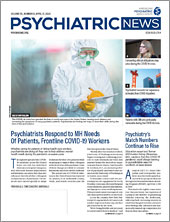A year ago, Jack Rozel, M.D., M.S.L., president of the American Association for Emergency Psychiatry, got calls from colleagues working in psychiatric emergency services asking how they can do more with less. How can they operate in an environment where risks are increasing even as resources are decreasing?
“And that was a year ago,” said Rozel, medical director for resolve Crisis Services and an associate professor of psychiatry at the University of Pittsburgh. With the coronavirus (COVID-19) outbreak, he said, “Things are only going to get worse.”
Over the years, the number of emergency department (ED) visits related to psychiatric concerns has increased. These patients tend to be held longer in the ED before being hospitalized.
As hospitals and EDs focus greater attention on diagnosing and treating patients with COVID-19, psychiatrists across the country are bracing for the inevitable impact on their patients.
“There are hard times ahead,” Rozel said. “But psychiatrists got into this work because we care about people, and we want to help people. Now, more than ever, we’re needed. If not us, then who?”
A Worsening Problem
COVID-19 will likely complicate access to care for people experiencing psychiatric crises. It may also increase the overall number of people struggling with mental health challenges, as widespread orders for people to remain isolated in their homes take psychological tolls.
“I’m hard-pressed to think of any psychiatric illness that gets better after isolation,” Rozel said. “There’s a reason that correctional systems and ancient cultures used isolation and banishment as punishment: They create suffering. We’ve added a lot of that to the lives of our patients not out of malice, but out of necessity.”
It’s not whether EDs have the capacity to conduct assessments and crisis evaluations for patients with psychiatric conditions that worries Scott Simpson, M.D., medical director of psychiatric emergency services at Denver Health and associate professor of psychiatry at the University of Colorado Anschutz Medical Campus. It’s what will happen to patients after such assessments are made that worries him.
“I think there are going to be a lot of challenges coming up related to transitions of care,” he said.
Psychiatric boarding—when patients are kept for hours, or even days, in the ED while they wait for available treatment—has been an issue at hospitals across the country for years. COVID-19 could worsen that already problematic dynamic, Simpson fears. Rather than being boarded, patients may be prematurely discharged.
“It is inevitable that we’re going to see asymptomatic patients [people who may have been exposed to COVID-19 but are not showing symptoms] that won’t be able to get an inpatient psychiatric bed,” he said. “Most EDs don’t attempt to provide psychiatric treatment. Rather, if patients have some risk, they proceed to inpatient care. But say those patients have a positive coronavirus test. They’re not going to be able to get an inpatient bed, and the ED will not be able to justify keeping them.”
Reaching Out
To help reduce the need for crisis services, psychiatrists and mental health professionals working in outpatient services should be connecting with patients, particularly those most vulnerable, explained Kim Nordstrom, M.D., J.D., an associate clinical professor of psychiatry at the University of Colorado School of Medicine. “This is paramount. Outpatient psychiatrists may be able to prevent crisis stabilization unit and ED visits, which in turn may reduce secondary exposure to the virus.”
Physicians should anticipate who is at risk for acute exacerbations of their symptoms during the pandemic and reach out to them, said Jon Levenson, M.D., an associate professor of psychiatry at Columbia University and chair of APA’s Council on Consultation-Liaison Psychiatry.
“In times of pandemics, psychiatrists can often play a primary care role, as well,” he said. “Proactively reaching out to these patients is an early intervention strategy before a florid crisis develops.” Physicians may want to consider scheduling more frequent visits with the patient or arranging for other clinical staff to reach out via telemedicine or phone, as well.
Physicians can also ensure their patients know about available crisis lines that patients can call rather than going to an ED, Levenson said. Some patients may benefit from a reassessment of their psychotropic medicines and dosage. Those who are acutely symptomatic might need a dosage increase to effectively treat their symptoms, he said.
“People with pre-existing psychiatric disorders are even more vulnerable with the uncertainty associated with the COVID-19 pandemic,” he said. “Many patients with psychiatric disorders who are already somewhat stigmatized and marginalized will feel even further isolated with the enforced quarantine, and they may start having more active symptomatology.”
Some patients will inevitably experience psychiatric crises during the COVID-19 pandemic. Physicians on inpatient psychiatric units will have to make hard decisions about which patients they accept and how they handle those with suspected COVID-19, Simpson said.
Inpatient units must be prepared to accept patients they may not otherwise, as capacity through the health care system increasingly focuses on COVID-19 patients. That also means physicians should prepare to be flexible about the types of patients they treat, Simpson said.
“We have to look at what infection control and treatment look like in the spaces where we normally work,” Simpson said. “Inpatient psychiatry units are very difficult places to implement infection control, but the fact is, we’re going to have a lot of coronavirus patients who are going to need inpatient care. It’s an inevitability.”
Self-Care Reminders
Psychiatrists should encourage patients to turn to reliable sources of information on COVID-19, as the news of the virus changes rapidly and misinformation is common, Levenson said.
“Part of this is making sure that crisis communication and messaging is as much about behavioral health care and self-care as it is about other coronavirus symptoms to watch out for,” Rozel said. “Social distancing is about physical distance, not emotional distance. Now, more than ever, we need connectedness. We need people to come out and say: ‘This is stressful—let’s talk about the warning signs. Let’s talk about when to raise your hand and ask for help.’”
But as psychiatrists work to ensure their patients are prepared, they must also take care of their own mental well-being, Rozel said. “It’s hard to care for the physical or mental wellness of other people, whether they’re patients or loved ones, if we’re not taking care of ourselves,” he said. ■


